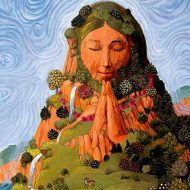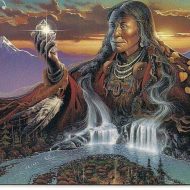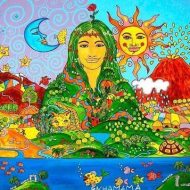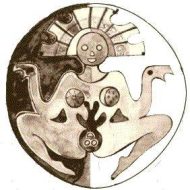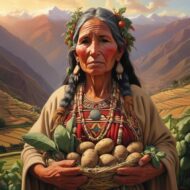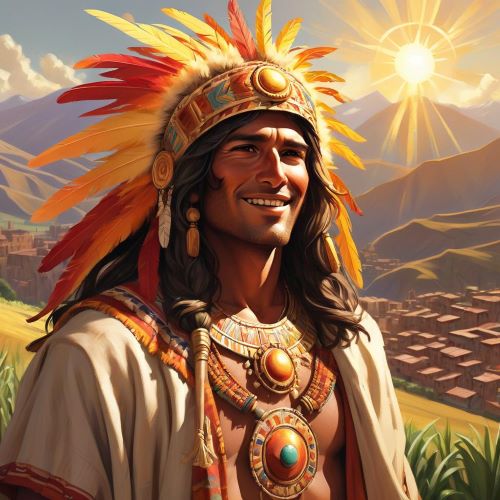Pachamama : The Earth Goddess
Listen
At a glance
| Description | |
|---|---|
| Origin | Inca Mythology |
| Classification | Gods |
| Family Members | Axomamma (Mother), Inti (Son) |
| Region | Peru, Bolivia, Chile, Ecuador, Columbia |
| Associated With | Agriculture, Earthquakes, Fertility |
Pachamama
Introduction
In the heart of the Andes Mountains, where snow-capped peaks pierce the sky and fertile valleys cradle ancient civilizations, resides Pachamama, the Inca goddess revered as Mother Earth. Her presence is woven into the very fabric of Andean life, a powerful force that sustains, nourishes, and demands respect. Pachamama, known as an agricultural deity, plays a crucial role in protecting crops and ensuring fertility within Incan mythology. The customs of the Andean people reflect their deep reverence for her, such as the tradition of pouring a small portion of chica, a fermented corn drink, on the ground as an offering to Pachamama.
Living in harmony with nature is a fundamental belief among Andean communities, who understand the importance of respecting Pachamama to avoid her wrath, believed to manifest in earthquakes when she is dishonored. To appease her and ensure favorable treatment, ceremonies known as pago a la tierra are performed, involving offerings of traditional items like corn beer and cocoa leaves. Shrines dedicated to Pachamama are constructed from natural materials such as tree trunks or rocks, serving as focal points for reverence and devotion.
Physical Traits
Pachamama’s portrayal in Inca art reflects her serene and nurturing essence, capturing the beauty and abundance of the earth. Often depicted as a mature woman adorned with bountiful harvests, she symbolizes the fertility of the land and the sustenance it provides. Her physical form is depicted in various ways, showcasing her multifaceted nature. Sometimes she appears as a mountain herself, embodying the very foundation of the world and nurturing life within her slopes. Pachamama’s imagery transcends rigid definitions, evoking a sense of tranquility and wisdom that resonates with those who seek her solace.
In addition to her depiction as a serene adult female bearing harvests of potatoes and cocoa leaves, Pachamama is also associated with sacred sites such as hallowed rocks and the revered boles of legendary trees. These shrines serve as focal points for reverence and devotion, honoring her connection to the natural world and the abundance it provides. Furthermore, Pachamama’s significance extends beyond her physical form, encompassing the four cosmological Quechua principles of Water, Earth, Sun, and Moon, which she embodies as the ultimate Earth Mother deity.
Family
Pachamama’s familial connections within the Inca pantheon are intricate and central to understanding her divine role. She is revered as the mother of Inti, the sun god, and Mama Killa, the moon goddess, although some sources also depict her as the wife of Inti. Additionally, Pachamama is associated with lightning and is sometimes referred to as its spouse. The complexity of her relationships reflects the multifaceted nature of Inca mythology.
In some traditions, Pachamama’s relationship with Inti symbolizes the cycle of life, as they together bring forth life and sustenance. However, other myths portray her as a powerful and independent entity, predating even the gods themselves. Some stories describe her as the mother of twin gods, Hanan Pacha (Upper World) and Kay Pacha (This World), underscoring her role as the progenitor of all creation.
The reverence for Pachamama extends beyond familial ties, encompassing her divine consort, Pachacamac, the creator god who shaped the world and its inhabitants. Together, they form a cosmic duality, embodying the complementary forces of creation and nurturing that sustain the universe. Pachamama’s divine offspring, including Inti and Mama Killa, further solidify her status as the matriarch of the Inca pantheon, embodying the interconnectedness of all life within the Andean cosmology.
Other Names
The Inca goddess is known by several names, with the primary one being Pachamama. Other titles for her include Mama Pacha, La Pachamama, and Mother Earth. The reverence for Pachamama transcends specific names, reflecting a deep respect for this vital force across Andean cultures.
“Pachamama,” her primary title, translates to “World Mother” in the Quechua and Aymara languages, spoken by the Inca people. Additionally, she is addressed as Mama Pacha (Mother Earth) and La Pachamama, the latter emphasizing her unique and singular nature with the definite article. These variations highlight the diverse ways in which Andean people connect with her presence.
In indigenous Quechua, Pachamama, also known as Mama Pacha, translates as Mother Earth or Mother Cosmos. Other cultures may refer to her as Gaia, La Pachamama, or simply Mother Earth. Despite the variation in names, the essence of her role remains consistent across different Andean cultures, emphasizing her status as the mother of all living things and the source of earthly abundance. Whether known as Mama Pacha among the Quechua-speaking peoples or Pachamamita in Aymara mythology, her enduring reverence persists among indigenous communities throughout the Andes.
Powers and Abilities
Pachamama’s powers are as vast as the earth itself, reflecting her role as the sustainer of life. She controls the weather, bringing rain to nourish crops and ensuring fertility throughout the land. Additionally, Pachamama governs the cycles of life and death, guiding souls to the afterlife and maintaining the cosmic order. Her influence extends beyond the natural realm into the spiritual, where she guides shamans and seekers toward harmony with the earth.
As the giver of life, Pachamama nurtures crops, sustains animals, and forms the foundation of human existence. She is associated with the mountains and believed to cause earthquakes when disrespected, prompting rituals and offerings to appease her. The principle of reciprocity, known as Ayni in Quechua, underscores the importance of giving back to the earth, fostering a balanced relationship between humanity and nature.
Pachamama is revered as a fertility goddess, overseeing planting and harvesting rituals. She is depicted as an ever-present and independent deity, possessing creative power to sustain life on earth. Offerings of llamas, guinea pigs, and intricate garments are sacrificed to honor her, ensuring her continued benevolence. Throughout history, the Inca described Pachamama as a dragon beneath the mountains, whose earthquakes serve as reminders to respect and honor her connection to the land.
Modern Day Influence
In countries like Bolivia and Peru, Pachamama’s relevance is experiencing a resurgence as traditional religious practices undergo a revival. Even among Christian communities in the region, invoking blessings of Pachamama has become accepted. In the 21st century, indigenous peoples in South America are increasingly tying environmental concerns to these ancient beliefs, emphasizing that taking too much from nature is akin to taking too much from Pachamama herself.
Ritual practices honoring Pachamama involve making toasts before gatherings and festivities, as well as performing the traditional challa ritual. During challa, a small amount of chicha, a traditional drink, is poured onto the ground as an offering to the goddess. Another special day of worship, Martes de challa, includes burying food, throwing sweets, and burning incense to express gratitude for the harvest.
The veneration of Pachamama persists long after the decline of the Inca empire, with indigenous communities in the Andean region continuing to practice rituals and offerings in her honor. Moreover, Pachamama’s concept has resonated with ecological movements worldwide, symbolizing the interconnectedness of all living things and the urgent need to protect the planet. From traditional ceremonies to contemporary environmental activism, Pachamama’s legacy endures as a potent reminder of humanity’s reliance on a healthy and vibrant Earth.
Related Images
Frequently Asked Questions
What does Pachamama mean?
Pachamama literally translates to “World Mother” in the Quechua and Aymara languages spoken by the Inca people. However, it’s often understood as “Mother Earth” because Pachamama embodies the Earth itself, its fertility, and its life-giving power.
What is the mythology of Pachamama?
Pachamama, the Inca Earth Mother, embodies fertility and creation. Depicted as a woman overflowing with crops, she’s one with the mountains, wielding power over nature. Myths depict her as the source of life, but also a force to be respected, demanding reciprocity from humanity. Her enduring legacy reminds us of our connection to the Earth and the need to protect it.
What is a Pachamama statue?
Forget a fixed Pachamama statue! In Inca tradition, her form is fluid. Artworks show her as a woman overflowing with crops, one with the earth. A 2019 Vatican incident involved Amazonian statues, mistakenly called “Pachamama,” causing a stir.
What does the Pachamama symbolize in love?
Pachamama’s love isn’t romantic, but vast. She nurtures all life, a mother’s tender embrace. Balance is key, like a healthy love’s flow. We take from her bounty, but respect must grow. Ayni, the act of giving back what we receive, reflects love’s cycle, for the Earth we believe.
Who celebrates Pachamama?
Pachamama is the Earth Mother goddess of the Andes. Indigenous peoples of Bolivia, Ecuador, Chile, Peru, and Argentina celebrate her. They offer thanks for harvests and ask for continued abundance. The main celebration happens around August 1st. Recently, some Andean people have adopted Pachamama worship influenced by New Age beliefs.

